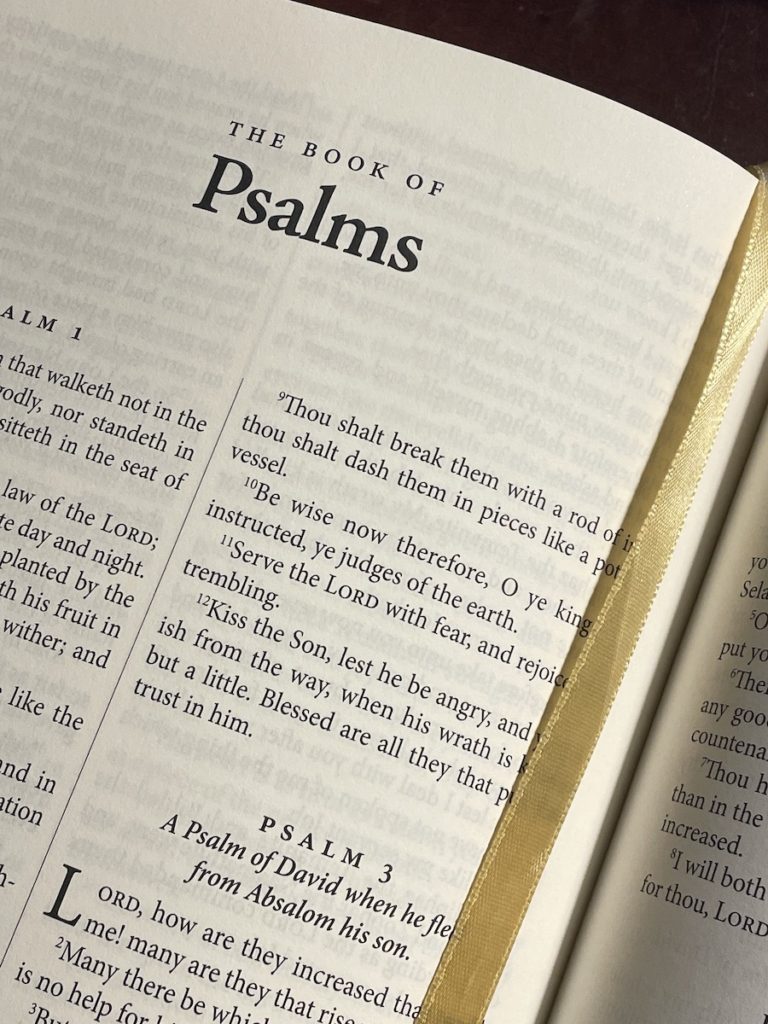
Psalm 65
Psalm 65:3, Atonement. (Heb. kaphar) YHVH will provide covering or expiation (by sacrifice) for our transgressions. Forgiveness of sin involves not just a judicial decree from a judge, but the idea of atonement as well; that is, a penalty price has to be paid, the scales of justice have to be balanced. For every crime a price must be paid, restitution must be made. Biblically, this is how forgiveness works.
Psalm 65:5, Your awesome deeds in righteousness. How does YHVH answer our prayers? In many ways. But one of those ways is through performing awesome deeds of righteousness or through providential or divinely orchestrated circumstances that occur in the life of the saint. The saint is wise to watch for these, so that he can give YHVH praise and thanks for them.
Psalm 65:7, Seas…people. Seas is a poetic Hebraism for people. In this case, verse eight implies that the people who “dwell in the farthest parts” are those who are the furthest away from Elohim spiritually.
Psalm 66
Psalm 66:18, If I regard iniquity. Iniquity is the Hebrew word aven meaning “trouble, vanity, wickedness; specifically an idol.” Anything in our lives that comes before our relationship with Elohim is an idolatrous stronghold to us and blocks our ability to serve, hear and obey Elohim. It hinders our relationship with him, takes us away from him, and thus blocks our prayers from being heard by him.
Psalm 67

Psalm 67:1–2, Face to shine…that your way. In analyzing this biblical passage, let’s apply some mathematical logic and discover the wonderful place to which it leads us. It’s a place that’s higher and better than any other! Here we go…
YHVH’s face or countenance shines like the sun in its full strength (Rev 1:16). He is the Sun of righteousness (Mal 4:2). The sun is the greater light that shines in the darkness of this world (Gen 1:16). The physical sun points to and is a representation of Yeshua who isn’t the greater light, but the Greatest Light that shone on this earth before the physical sun was created on the fourth day, and will shine once again on the New Jerusalem (Rev 21:23) as he shone on the first three days of creation (Gen 1:3).
Presently, Yeshua is the Light of the world (John 8:12) that is contained in his Torah-Word, which is truth, and which is revealed by the Spirit of Elohim (John 16:13) to those who humbly and repentantly seek it like little children (Matt 18:3–4).
Moreover, Yeshua is the Word of Elohim that was made flesh (John 1:1, 14), and he is a spiritual light that shines in the darkness of this world to show men the way out of the darkness and to his Father in heaven (John 1:4;–5; 8:12, 9:5 cp. 14:6) who himself dwells in supernal light (1 Tim 6:16; Dan 2:22; 1 John 1:5; Jas 1:17).
Light in the Scriptures is also a metaphor for truth (John 3:21) and the Torah (Prov 6:23 cp. Ps 119:142, 151). Light is also a metaphor for the Word of Elohim (Ps 119:105). Yeshua was and is that Word (John 1:1, 14).
Now let’s go back to Psalm 67:1–2. When Elohim causes his face to shine on us, we will be blessed and receive his mercy (verse 1). The result will be that we will know his ways and his salvation, which is Yeshua (salvation is the Hebrew word Yeshua in verse 2).
Can the truth of Elohim’s word be any clearer than this? When we understand these simple biblical truths, and humbly submit ourselves to them and walk in the light of this glorious truth, our lives will be in perfect alignment or in sync with the plumb line of YHVH’s laser light-like truth. This puts us on the straight and narrow path that leads to eternal life, and it places us in the middle of YHVH’s river of life (Ps 1:3) that flows from his throne and a tree of life (Prov 3:18 cp. Ps 1:3, read vv. 1–6 for context).
This spot is where it’s at—the sweet spot of life (see Ps 1:1–6)! Yet men are so hard-hardhearted, stiffnecked, rebellious and arrogant that they refuse to see these simples truths because they love the darkness of their sin and refuse to come to the light of Yeshua (John 3:19–20).
Those of you who are privileged to have the light of YHVH’s countenance shining on you, give him the glory he deserves for his wonderful merciful grace in your life, and take a moment to offer up a heartfelt prayer of thanksgiving!
Psalm 68
Psalm 68:4, YAH. According to TWOT, Yah (Strong’s H3050; TWOT 484b) is a contraction of YHVH (Strong’s H3068, see TWOT 484b) and is found some 50 times in the Tanakh. Many names in the Tanakh contain this abbreviated form of YHVH (Yehovah) including Yehonatan and Yehoshaphat. Hebrew scholar, Nehemiah Gordon, agrees that Yah is the abbreviated form of His name YHVH, but he states that it derives an ancient practice of taking the first and last letter of a word to express an abbreviation. So the first and last letters of YHVH produce the abbreviation Yah (from an article entitled “The Pronunciation of the Name”). Yah is found in several other scriptures as well including Isa 12:2; 26:4; 38:11.
Psalm 68:5, Mountain of Bashan. Bashan is in the region of Mount Hermon, and the mountain mentioned here the same mountain. This was the mountain of the Gen 6 illicit angelic incursion into the affairs of mankind and where the Gates of Hell existed that was the opening of the abyss from which the fallen angels or demons entered and exited. Hermon is the tallest mountain the entire region at must under 10,000 feet high. No wonder Satan wants his seat of government to be there, since mountains in the poetic language of Scripture are often a metaphor for seats of government.


Ya-er Yahavah pa-nav ay-le-cha ve-ye-chu-neh-cha.
Blessings, John